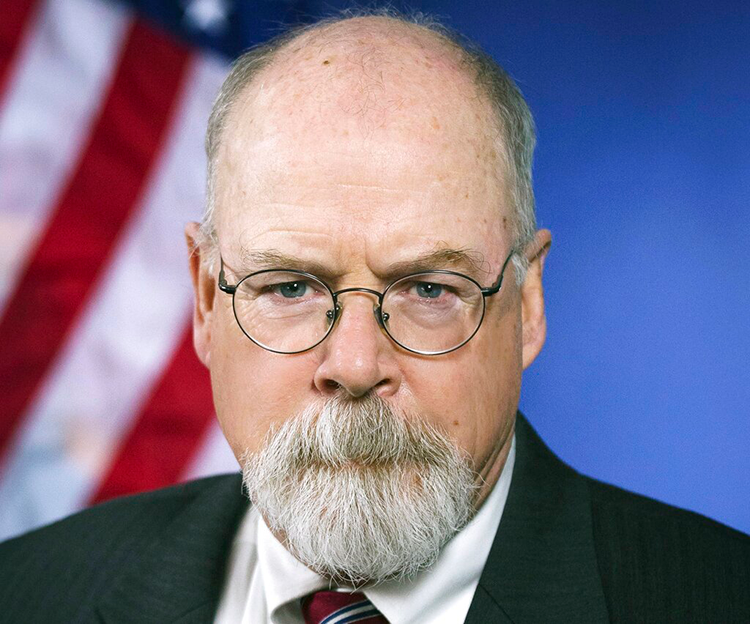Amid internal ethics disputes, special counsel probe into origins of Russia investigation finds no deep-state plot

Special counsel John Durham’s probe of the origins into the Russia investigation is starting to wrap up without finding a deep-state plot to implicate the campaign of former President Donald Trump. Photo from the U.S. Department of Justice via the Associated Press.
Special counsel John Durham’s probe of the origins into the Russia investigation is starting to wrap up without finding a deep-state plot to implicate the campaign of former President Donald Trump, according to a story based on anonymous sources by the New York Times.
At one point, the New York Times reports, the investigation expanded to include suspicious financial dealings related to Trump. The New York Times didn’t have specifics, and, in any event, the financial probe yielded no charges against anyone.
The New York Times said its story was based on a monthslong review and conversations with anonymous sources.
“Interviews by the Times with more than a dozen current and former officials have revealed an array of previously unreported episodes that show how the Durham inquiry became roiled by internal dissent and ethical disputes as it went unsuccessfully down one path after another,” the New York Times said. At the same time, Trump and then-U.S. Attorney General William Barr “promoted a misleading narrative of its progress.”
Three lawyers working on the probe who had disputes with Durham were his “No. 2 and longtime aide” Nora R. Dannehy, as well as Anthony Scarpelli and Neeraj N. Patel.
Durham and Barr publicly disputed findings by the Department of Justice’s inspector general that the FBI had a legal basis to open the probe of Russian collusion. The basis was a tip from an Australian diplomat that a Trump campaign adviser appeared to have advance knowledge that Russia would release hacked Democratic emails.
Barr said the FBI opened its investigation “on the thinnest of suspicions,” while Durham said he didn’t agree with some of the inspector general’s conclusions about the opening of the FBI probe.
But Durham’s investigation never found evidence contradicting the inspector general’s findings, the New York Times reports. After finding no intelligence abuses, the probe’s focus switched to look for evidence that the Clinton campaign conspired to frame Trump for Russian collusion.
Durham relied on memos written by Russian intelligence analysts supplied to the CIA by a Dutch spy agency. Some thought that the memos deliberately contained misinformation, however.
Some of the memos had reportedly claimed that the executive vice president of a George Soros organization, Leonard Benardo, had conversations with a Democratic representative about protecting Hillary Clinton during an investigation of her emails.
Durham asked a judge to allow him to seize information about Benardo’s emails and then went to a grand jury. The official cooperated, and “the result appears to have been another dead end.”
The New York Times reports on several disputes between Durham and lawyers on his team.
Dannehy had opposed Durham’s use of a grand jury to get Benardo’s emails. She urged him to tell Barr to stop commenting on the investigation in a misleading way. She “erupted” when she learned that members of Durham’s team had written a draft interim report. She maintained that there should be no report before the end of the investigation and certainly not before the 2020 election. And she said the draft report had taken disputed information as true.
Dannehy sent a memo with her concerns about the interim report to colleagues and then resigned in September 2020. Durham did not release an interim report.
Scarpelli and Patel had objected to Durham’s plans to indict Michael Sussmann, a Democratic lawyer who told the FBI about a tip on possible communications between the Trump Organization and a Russian bank. Durham wanted to indict Sussman for lying to the FBI for saying he wasn’t acting on behalf of Clinton’s presidential campaign.
Scarpelli and Patel argued that the evidence was slight, and the case wouldn’t normally be prosecuted. They warned that an acquittal would undermine faith in Durham’s investigation.
Durham persisted. Scarpelli “quit in protest,” and Patel soon left, according to the New York Times. Sussman was acquitted. Trial testimony showed that the Clinton campaign didn’t want Sussman to go to the FBI but did want stories in the press.
After he was no longer the attorney general, Barr told Fox News that the Sussman case had “crystallized the central role played by the Hillary campaign in launching as a dirty trick the whole Russiagate collusion narrative and fanning the flames of it.”
Hat tip to Original Jurisdiction.
See also:
ABAJournal.com: “AG Barr appoints special counsel to investigate illegality in probe of Russian election influence”



